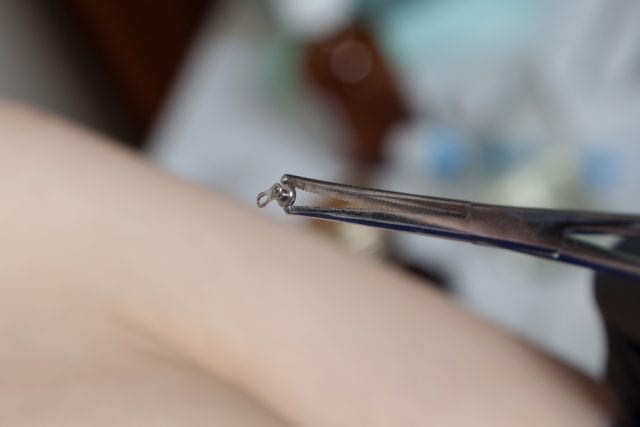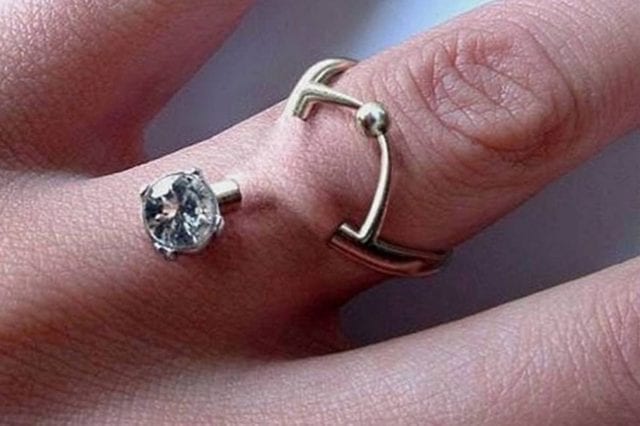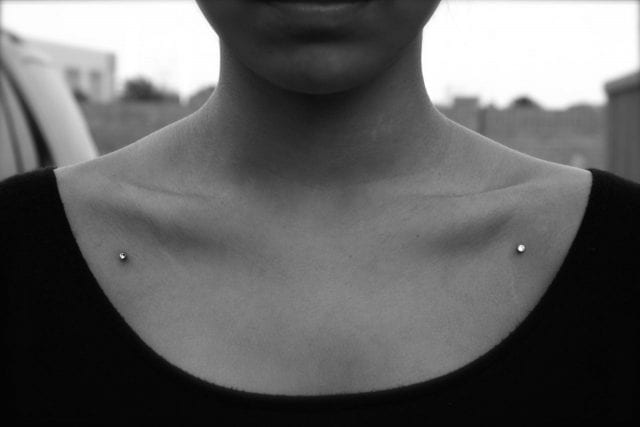
Every year, new fads pop up in the world of wedding and engagement jewelry. From “management” rings to finger tattoos, people are choosing to profess their love in increasingly unique ways.
Now, finger piercings are the next big engagement trend. Many soon-to-be newlyweds are heading to their local tattoo and piercing shops, but is it a safe practice to adopt?
What are Engagement Ring Piercings?

Ring piercings are more or less what you’d expect. It’s a piece of jewelry that is inserted into your skin where you would normally wear an engagement ring.
Traditional piercings typically feature and entry and exit point (such as the earlobe, nostril, or lip piercings). Microdermal piercings, however, are a bit more complicated since they are secured from inside the tissue. A stone, ball, or other ornament is fixed to a dermal anchor, which is a device that fastens the piercing from under the skin.
In some cases, people use a barbell or even an entire ring as subdermal jewelry. These modifications usually extend the healing process and considerably increase the recipient’s overall discomfort.
What is the Process?
Since dermal piercings are more involved than typical piercings, there is considerably more care and attention involved. First and foremost, they are usually more painful than other popular piercing options – both at the time of insertion and throughout the healing period.

On average, dermal piercings take 12 weeks or longer to heal. Additionally, the skin around the fingers is an especially sensitive spot for most people. If that isn’t enough to make you cringe, they also require more of a commitment.
Unlike most other piercings, you can’t simply remove the jewelry if you decide you don’t want it anymore. These piercings need to be taken out by a professional, and the procedure could be considered minor surgery.
Are there Risks Involved?
If you’re wondering whether getting a ring piercing will cause any lifelong damage, it really depends on your lifestyle, genetic composition, and luck.
On one side of the spectrum, the most you might suffer is some inflammation and soreness for an extended period of time. On the other hand, you risk injury if you happen to snag the jewelry on something – since your skin will be coming out with it.
Even if external factors aren’t a problem, everyone reacts to piercings differently, and your body might reject the piercing, preventing it from healing properly and leaving you vulnerable to infection.
Bottom Line: Are Ring Piercings Safe?
Piercings, in general, are somewhat risky, since you’re essentially inserting a foreign object into your body. But, due to the placement and general issues regarding micro dermal piercings on sensitive areas, they have more potential to cause harm than other piercing types.

If you use your hands regularly, have a history of piercing rejection, or ever expect to catch your hand on a towel or piece of clothing, seriously reconsider getting a ring piercing as your engagement symbol. Instead, look into different metal options like 14 karat gold or alternative engagement ring styles.
If you are more worried about losing a ring than you are about disfiguring your hand or, at the very least, experiencing a long period of discomfort, then you might make it out of the piercing shop unscathed. Basically, you’d be in the minority if you were lucky enough to skip any of these unfortunate side effects.








